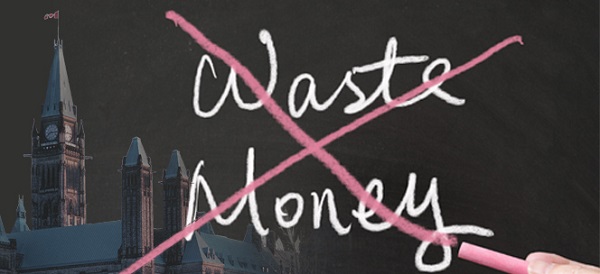Business
Canada’s department of government efficiency: A blueprint

From the Canadian Taxpayers Federation
Average compensation for a federal bureaucrat is $125,300. Cutting back the bureaucracy to population growth would save taxpayers $9 billion every year
Dumb government spending doesn’t stop at the 49th parallel.
U.S. President-elect Donald Trump announced the creation of a Department of Government Efficiency, with a mandate to “dismantle government bureaucracy, slash excess regulations, cut wasteful expenditures, and restructure federal agencies.”
Those marching orders sure would sound good in a prime minister’s mandate letter to a finance minister. And here’s the blueprint they should follow.
Begin with crazy research Canadian taxpayers are forced to subsidize.
The Social Sciences and Humanities Research Council spends $1 billion a year supporting “research and research training in the social sciences and humanities.”
Here’s a little taste of the reports it funds with your tax dollars:
- Gender Politics in Peruvian Rock Music ($20,000)
- Cart-ography: tracking the birth, life and death of an urban grocery cart, from work product to work tool ($105,000)
- My Paw in Yours: Dead Pets and Transcendence of Species Divides in Experimental Art-Making Practice ($17,500)
- Playing for Pleasure: The Affective Experience of Sexual and Erotic Video Games ($50,000)
And that’s just the tip of the iceberg.
Parks Canada put Mr. Magoo in charge of its hunting operations. It spent four years and $10,000 capturing a single bullfrog and dropped $800,000 hunting 84 deer on a B.C. Island. How can a simple hunt cost $10,000 per deer?
Well, hunting gets more expensive when instead of your grandpa’s old rifle, you use prohibited semi-automatic weapons, instead of a box of shells, you get a crate of ammo, and instead of your buddy’s old pickup, you rent a helicopter for $67,000.
Or how about the $8-million barn at Rideau Hall. Or $12,500 live senior citizen sex story shows. Or the $8,800 sex toy show in Germany. Or the millions wasted producing government podcasts no one listens to.
Then there’s government officials living high on the hog.
Governor General Mary Simon spent $71,000 on limo services in Iceland. Bureaucrats spend $76,000 a month renting art. Global Affairs Canada spends $51,000 on booze a month.
Now, the big stuff.
The size and cost of the government is out of control. Prime Minister Justin Trudeau hired 108,000 new bureaucrats. That’s a 42 per cent increase in less than a decade.
Had the bureaucracy only increased with population growth, there would be 72,491 fewer bureaucrats today.
Average compensation for a federal bureaucrat is $125,300. Cutting back the bureaucracy to population growth would save taxpayers $9 billion every year.
It’s time to stop rewarding failure with bonuses.
The feds dished out $1.5 billion in bonuses since 2015.
And the bonuses flow despite federal departments only managing to hit half of their performance targets once in the past five years.
Government executives overseeing ArriveSCAM took $340,000 in bonuses.
The Canada Mortgage and Housing Corporation rubberstamped $102 million in bonuses amid the worst housing crisis in Canadian history.
The Bank of Canada printed $20 million in bonus cheques in 2022, as inflation reached a 40-year high.
The CBC dished out $132 million in bonuses since 2015.
The next thing on the chopping block? Corporate welfare.
Trudeau put taxpayers on the hook for $30 billion in subsidies to multinational corporations like Honda,Volkswagen, Stellantis and Northvolt.
Federal corporate subsidies totalled $11.2 billion in 2022 alone.
Shutting down the federal government’s seven regional development agencies would save taxpayers an estimated $1.5 billion annually.
True efficiency would also mean eliminating failing government operations altogether. The feds should sell any Crown corporation that can, or should, be left to the private sector.
Here are a few examples.
The CBC, which takes more than $1 billion from taxpayers annually.
Canada Post, which lost $1.2 billion in the last two years and forecasts “larger, unsustainable losses in future years.”
VIA Rail, took $1.8 billion in taxpayer cash during the past five years just to cover operating losses.
The bad news for taxpayers is we pay too much tax because the government wastes too money. The list of wasteful spending in this article is far from exhaustive.
Other examples include the multi-billion dollar gun confiscation that police officers say won’t work, the $25-billion equalization scheme and taxpayer-funded media bailouts, among others.
The good news is a champion of taxpayers could make massive cuts and barely anyone outside the Ottawa bubble would notice.
This is the blueprint to slash Ottawa’s wasteful, bloated bureaucracy. All we need now is a prime minister with the guts to pick up the scissors.
Business
Feds pull the plug on small business grants to Minnesota after massive fraud reports

The Small Business Administration is moving to freeze grant money flowing into Minnesota after explosive allegations of large-scale fraud tied to state oversight failures, with SBA Administrator Kelly Loeffler signaling an immediate crackdown following recent independent reporting.
In a series of comments shared publicly by conservative commentator Benny Johnson, Loeffler said the agency is “cutting off and clawing back” SBA grants to the state while investigators dig deeper into what she described as a rapidly expanding fraud network.
Johnson wrote that Loeffler told him she was “disgusted and sickened” after reviewing footage from YouTuber Nick Shirley, whose on-the-ground reporting in Minnesota highlighted what he said were sham daycare and learning centers collecting millions in public funds despite showing little or no sign of legitimate operations.
According to Johnson, Loeffler blamed the situation on Democrat Gov. Tim Walz, accusing his administration of refusing to enforce basic rules governing small businesses and allowing fraud to flourish unchecked.
Johnson said Loeffler told him SBA investigators were able to identify roughly half a billion dollars in suspected fraud within days of focusing on Minnesota, calling the operation an “industrial-scale crime ring” that ripped off American taxpayers.
“Pending further review, SBA is freezing all grant funding to the state in order to stop the rampant waste of taxpayer dollars and uncover the full depth of fraud,” Loeffler said, according to Johnson’s account, adding that the total scope of the scheme remains unknown and could reach into the billions.
The controversy gained national traction after Shirley posted video of himself visiting multiple facilities, including a South Minneapolis site known as the Quality Learning Center, which he reported was approved for federal aid for up to 99 children but appeared inactive during normal business hours.
The center’s sign, Shirley noted, even misspelled the word “learning” as “learing.”
In the footage, a woman inside the building is heard shouting “Don’t open up,” falsely claiming Shirley and his colleague were Immigration and Customs Enforcement agents.
After the video circulated, Rep. Tom Emmer, a Republican, publicly demanded answers from Walz, questioning how such facilities were approved for millions in taxpayer funding.
Shirley’s reporting followed earlier investigations, including a November report by City Journal alleging that members of Minnesota’s Somali community had sent millions of dollars in stolen taxpayer funds overseas, with some of that money reportedly ending up in the hands of Al-Shabaab, a U.S.-designated terrorist organization.
While Walz’s administration has insisted it takes fraud seriously, the SBA’s decision to halt grant funding marks one of the most aggressive federal responses yet, underscoring how rapidly a local scandal has escalated into a national reckoning over oversight, enforcement, and accountability in Minnesota.
Business
Stripped and shipped: Patel pushes denaturalization, deportation in Minnesota fraud

FBI Director Kash Patel issued a blunt warning over the weekend as federal investigators continue unraveling a sprawling fraud operation centered in Minnesota, saying the hundreds of millions already uncovered represent “just the tip of a very large iceberg.”
In a lengthy statement posted to social media, Patel said the Federal Bureau of Investigation had quietly surged agents and investigative resources into the state well before the scandal gained traction online. That effort, he said, led to the takedown of an estimated $250 million fraud scheme that stole federal food aid intended for vulnerable children during the COVID pandemic.
According to Patel, the investigation exposed a network of sham vendors, shell companies, and large-scale money laundering operations tied to the Feeding Our Future case. Defendants named by the FBI include Abdiwahab Ahmed Mohamud, Ahmed Ali, Hussein Farah, Abdullahe Nur Jesow, Asha Farhan Hassan, Ousman Camara, and Abdirashid Bixi Dool, each charged with offenses ranging from wire fraud to conspiracy and money laundering.
Patel also said Abdimajid Mohamed Nur and others were charged in a separate attempt to bribe a juror with $120,000 in cash. He noted that several related cases have already resulted in guilty pleas, prison sentences of up to 10 years, and nearly $48 million in restitution orders.
Despite those outcomes, Patel warned the case is far from finished.
“The FBI believes this is just the tip of a very large iceberg,” he said, adding that investigators will continue following the money and that the probe remains ongoing. Patel further confirmed that many of those convicted are being referred to immigration authorities for possible denaturalization and deportation proceedings where legally applicable.
The renewed focus follows a viral video circulated by independent journalist Nick Shirley, which appeared to show multiple childcare and learning centers operating as empty or nonfunctional storefronts. The footage sparked immediate backlash from Republicans, including Vice President JD Vance.
House Majority Whip Tom Emmer accused Minnesota Gov. Tim Walz of sitting idle while massive sums were stolen from taxpayers. Walz addressed the allegations during a November press conference, before the full scope of the fraud became public, saying the scandal “undermines trust in government” and threatens programs meant to help vulnerable residents.
“If you’re committing fraud, no matter where you come from or what you believe, you are going to go to jail,” Walz said at the time.
Authorities say the alleged schemes date back to at least 2015, beginning with overbilling Minnesota’s Child Care Assistance Program and later expanding into Medicaid-funded disability and housing programs. One such housing initiative, aimed at helping seniors and disabled residents secure stable housing, was shut down earlier this year after officials cited what they described as large-scale fraud.
The fallout has already reached the federal level. Last month, President Trump announced the suspension of Temporary Protected Status for Somali nationals, arguing that Minnesota had become a hub for organized welfare fraud and money laundering activity.
-

 Digital ID2 days ago
Digital ID2 days agoCanadian government launches trial version of digital ID for certain licenses, permits
-

 Agriculture2 days ago
Agriculture2 days agoEnd Supply Management—For the Sake of Canadian Consumers
-

 Alberta2 days ago
Alberta2 days agoAlberta Next Panel calls to reform how Canada works
-

 International1 day ago
International1 day agoGeorgia county admits illegally certifying 315k ballots in 2020 presidential election
-

 Business1 day ago
Business1 day agoThe “Disruptor-in-Chief” places Canada in the crosshairs
-

 Artificial Intelligence1 day ago
Artificial Intelligence1 day agoUK Police Pilot AI System to Track “Suspicious” Driver Journeys
-

 Energy1 day ago
Energy1 day ago‘The electric story is over’
-

 International2 days ago
International2 days agoWorld-leading biochemist debunks evolutionary theory






